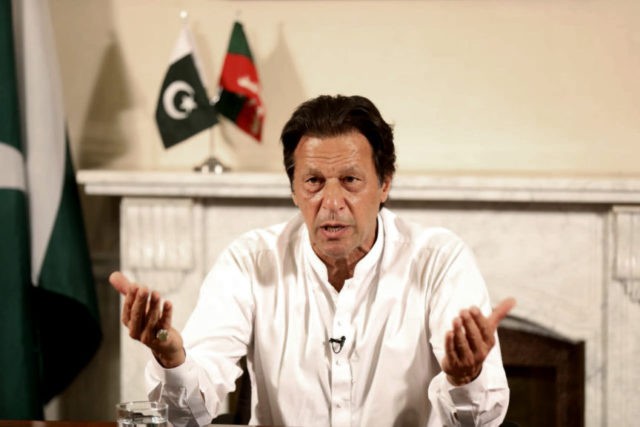New Delhi canceled a meeting on Friday between Pakistani and Indian ministers on the sidelines of the United Nations General Assembly in New York, citing Islamabad’s “evil agenda” and “unclean intentions” as the reason.
The Indian Minister of External Affairs (MEA) spokesperson, Raveesh Kumar, explicitly attributed the development to the “brutal” killing of three policemen in Kashmir and the release of stamps “glorifying” the terrorist Burhan Wani, who served as commander of the Kashmiri jihadist group, Hizbul Mujahideen (HM), before Indian forces took him out in July 2016.
In the months following Wani’s death, clashes between India and Pakistan along their border in Kashmir have intensified despite a 2003 ceasefire between the two countries.
Kashmir, a Muslim-majority region claimed by New Delhi, Islamabad, and Beijing, is divided between regions occupied by India and Pakistan. Although China has managed to remain in the shadows of the ongoing India-Pakistan dispute over Kashmir, Beijing is known to back Islamabad’s claim.
Since the 1947 split of India into two independent states — Hindu-majority India and Muslim-majority Pakistan — the two nuclear-armed countries have been regional enemies. India and Pakistan have fought several wars over territory, particularly Kashmir.
On Friday, Kumar reportedly said:
The latest brutal killings of our security personnel by Pakistan-based entities and the recent release of a series of twenty postage stamps by Pakistan glorifying a terrorist and terrorism confirm that Pakistan will not mend its ways. Now, it is obvious that behind Pakistan’s proposal for talks to make a fresh beginning, the evil agenda of Pakistan stands exposed and the true face of the new Prime Minister of Pakistan Imran Khan has been revealed to the world in his first few months in office.
“Any conversation with Pakistan in such an environment would be meaningless. In view of the changed situation, there will be no meeting between the Foreign Ministers of India and Pakistan in New York,” added the spokesperson.
According to the Times of India (TOI), terrorists from the Pakistan-based terrorist group Hizbul Mujahideen (HM) killed the three Indian security troops mentioned by Kumar.
U.S. President Donald Trump’s administration designated HM as a foreign terrorist organization last year.
Kumar’s Pakistani counterpart described India’s decision to cancel the meeting as “unfortunate,” Dawn reported Friday.
“We had already told India that if they take one step towards us, we will take two. However, it seems that they faltered after taking just one step,” Foreign Minister Shah Mahmood Qureshi reportedly said.
The Pakistani official was referring to newly elected Pakistani Prime Minister Khan’s victory speech in August in which he expressed a desire to “improve relations with India, if their leadership also wants it.”
“If they take one step towards us, we will take two, but we at least need a start,” Khan vowed.
The Pakistani prime minister reportedly wrote a letter to Indian counterpart Prime Minister Narendra Modi seeking to engage in bilateral negotiations on key issues “challenging the relationship” and requesting the meeting in New York.
In an interview with Dawn, Qureshi argued that Pakistan reached out to its foe, India, in good faith but suggested that the opportunity for talks had passed.
“Pakistan has held a positive outlook towards the situation while India’s attitude has not been so forthcoming,” he said.
Asked if Islamabad would continue to extend an olive branch to New Delhi despite the Indian minister’s recent comments, Qureshi reportedly “negated the idea,” adding, “We said that we want dialogue — but in a dignified manner.”
Fawad Chaudhry, Pakistan’s minister for Information, told GeoTV that “Indian extremist groups” spoiled the potential for peace talks between Islamabad and New Delhi, Dawn noted.
Chaudhry reportedly declared:
The world sees that we talked about peace and dialogue. They see that we are doing whatever we can for that cause. On the other hand, there are two ways to look at what India has done, one of which suggests that Indian extremist groups are sabotaging the relationship between India and Pakistan, and the Indian government is working under that same extremist mindset.”
We have been extending the hand of friendship all through, PM Khan said in his first speech that if they take one step towards us, we will take two…This shows that Pakistan stands for peace, but there is a section of the Indian society that does not want this and that section holds a lot of influence there.
The Times of India acknowledged that India-Pakistan relations have deteriorated in recent years, particularly after the September 2016 “surgical strikes” India carried out across its border with Pakistan in Kashmir, known as the Line of Control (LoC).
The Indian strikes came after terror attacks by Pakistan-based groups in response to Wani’s death.

COMMENTS
Please let us know if you're having issues with commenting.